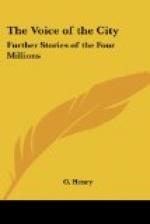I crossed a crow’s-foot of street-car tracks, and skirted the edge of an umbrageous park. An artificial Diana, gilded, heroic, poised, wind-ruled, on the tower, shimmered in the clear light of her namesake in the sky. Along came my poet, hurrying, hatted, haired, emitting dactyls, spondees and dactylis. I seized him.
“Bill,” said I (in the magazine he is Cleon), “give me a lift. I am on an assignment to find out the Voice of the city. You see, it’s a special order. Ordinarily a symposium comprising the views of Henry Clews, John L. Sullivan, Edwin Markham, May Irwin and Charles Schwab would be about all. But this is a different matter. We want a broad, poetic, mystic vocalization of the city’s soul and meaning. You are the very chap to give me a hint. Some years ago a man got at the Niagara Falls and gave us its pitch. The note was about two feet below the lowest G on the piano. Now, you can’t put New York into a note unless it’s better indorsed than that. But give me an idea of what it would say if it should speak. It is bound to be a mighty and far-reaching utterance. To arrive at it we must take the tremendous crash of the chords of the day’s traffic, the laughter and music of the night, the solemn tones of Dr. Parkhurst, the rag-time, the weeping, the stealthy hum of cab-wheels, the shout of the press agent, the tinkle of fountains on the roof gardens, the hullabaloo of the strawberry vender and the covers of Everybody’s Magazine, the whispers of the lovers in the parks—all these sounds must go into your Voice—not combined, but mixed, and of the mixture an essence made; and of the essence an extract—an audible extract, of which one drop shall form the thing we seek.”
“Do you remember,” asked the poet, with a chuckle, “that California girl we met at Stiver’s studio last week? Well, I’m on my way to see her. She repeated that poem of mine, ‘The Tribute of Spring,’ word for word. She’s the smartest proposition in this town just at present. Say, how does this confounded tie look? I spoiled four before I got one to set right.”
“And the Voice that I asked you about?” I inquired.
“Oh, she doesn’t sing,” said Cleon. “But you ought to hear her recite my ‘Angel of the Inshore Wind.’”
I passed on. I cornered a newsboy and he flashed at me prophetic pink papers that outstripped the news by two revolutions of the clock’s longest hand.
“Son,” I said, while I pretended to chase coins in my penny pocket, “doesn’t it sometimes seem to you as if the city ought to be able to talk? All these ups and downs and funny business and queer things happening every day—what would it say, do you think, if it could speak?”
“Quit yer kiddin’,” said the boy. “Wot paper yer want? I got no time to waste. It’s Mag’s birthday, and I want thirty cents to git her a present.”
Here was no interpreter of the city’s mouthpiece. I bought a paper, and consigned its undeclared treaties, its premeditated murders and unfought battles to an ash can.




